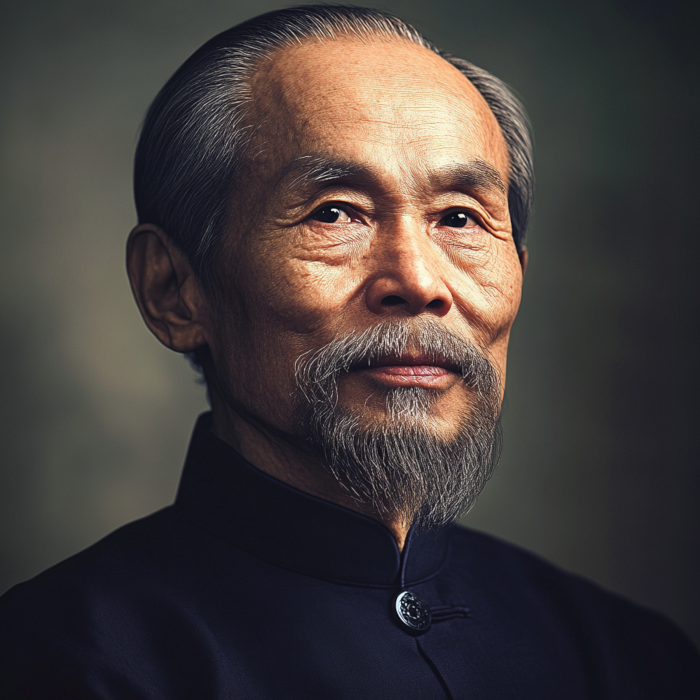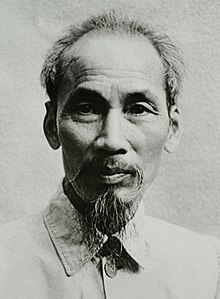


Ho Chi Minh (1890–1969) was a Vietnamese revolutionary leader and key figure in the struggle for Vietnamese independence from French colonial rule and later against American influence in Vietnam. He is revered as the founding father of modern Vietnam and served as its President and Prime Minister.
Ho Chi Minh was born into a poor but scholarly family. His father, Nguyễn Sinh Sắc, was a Confucian scholar and teacher who later became an imperial magistrate but resigned due to disagreements with the French colonial authorities.
From a young age, Ho Chi Minh was exposed to the harsh realities of colonial rule, which shaped his nationalist and anti-colonial sentiments. He attended a French-run school in Huế, where he was introduced to Western ideas and the principles of the French Revolution, which influenced his later political beliefs.
In 1911, Ho Chi Minh left Vietnam, traveling widely in the next 30 years, including stops in France, the United States, the United Kingdom, and various parts of Asia. During this time, he worked in various menial jobs while engaging in political activities and developing his revolutionary ideas.
In France: He lived in Paris from 1919 to 1923, where he became involved with socialist and communist movements. In 1919, under the pseudonym Nguyễn Ái Quốc (Nguyen the Patriot), he submitted a petition to the Versailles Peace Conference demanding greater rights for the Vietnamese people, but it was ignored. This experience further radicalized him.
Communist Involvement: Ho Chi Minh joined the French Communist Party in 1920, becoming one of the founding members. He then traveled to Moscow, where he received training at the Communist International (Comintern) and developed strong ties with Soviet leaders. By 1925, he was active in the Chinese communist movement, training Vietnamese revolutionaries.
Vietnamese Communist Party: In 1930, Ho Chi Minh founded the Indochinese Communist Party, which later became the Communist Party of Vietnam. He aimed to lead the fight for Vietnamese independence from French colonial rule.
World War II and Japanese Occupation: During World War II, Vietnam was occupied by Japan. Ho Chi Minh saw this as an opportunity to push for independence. In 1941, he founded the Viet Minh (League for the Independence of Vietnam), a broad-based nationalist organization that fought against both Japanese and French forces.
Declaration of Independence: After Japan's defeat in World War II, the Viet Minh took control of Hanoi. On September 2, 1945, Ho Chi Minh declared Vietnam's independence from France, reading the Declaration of Independence in Hanoi's Ba Đình Square. The declaration echoed the U.S. Declaration of Independence and marked the beginning of the Democratic Republic of Vietnam.
France, unwilling to relinquish its colonial empire, sought to reassert control over Vietnam, leading to the First Indochina War (1946–1954). Ho Chi Minh and the Viet Minh led the resistance against the French.
Battle of Dien Bien Phu: The war culminated in the decisive Battle of Dien Bien Phu in 1954, where Viet Minh forces defeated the French, leading to the Geneva Accords.
Partition of Vietnam: The Geneva Accords resulted in the temporary partition of Vietnam at the 17th parallel, with Ho Chi Minh's government in control of the North (Democratic Republic of Vietnam) and a separate government in the South (Republic of Vietnam), backed by the United States. The agreement called for nationwide elections in 1956 to reunify the country, but these elections were never held.
The failure to hold elections and the growing conflict between the communist North and the anti-communist South, supported by the U.S., led to the Vietnam War (1955–1975). Ho Chi Minh was the symbolic leader of North Vietnam throughout much of the war, although by the mid-1960s, his role became more ceremonial due to his advancing age and health issues.
Death: Ho Chi Minh died on September 2, 1969, in Hanoi, at the age of 79. His death occurred before the end of the Vietnam War, and he did not live to see the reunification of Vietnam.
Legacy: Ho Chi Minh is revered in Vietnam as the founding father of the nation. His image and name are prominent throughout the country, and his mausoleum in Hanoi is a site of national pilgrimage. The former capital of South Vietnam, Saigon, was renamed Ho Chi Minh City in his honor after the war ended in 1975.
Philosophy: Ho Chi Minh's political philosophy combined Marxism-Leninism with Vietnamese nationalism. He was pragmatic, often adapting his strategies to the changing political landscape while remaining steadfast in his goal of Vietnamese independence and unity.
Global Influence: Ho Chi Minh remains a symbol of anti-colonial struggle and is respected as a leader who successfully fought against imperial powers. His life and work have influenced revolutionary movements worldwide.
Ho Chi Minh's impact on Vietnam and world history is profound, with his leadership central to the establishment of an independent and unified Vietnam. He remains a figure of immense respect in his homeland and a symbol of resilience and determination in the face of adversity.

We use cookies
We use cookies and other tracking technologies to improve your browsing experience on our website, to show you personalized content and targeted ads, to analyze our website traffic, and to understand where our visitors are coming from. Privacy Policy.